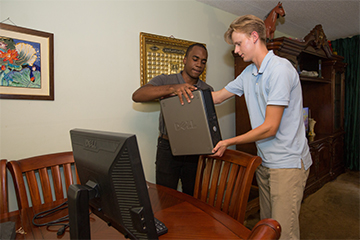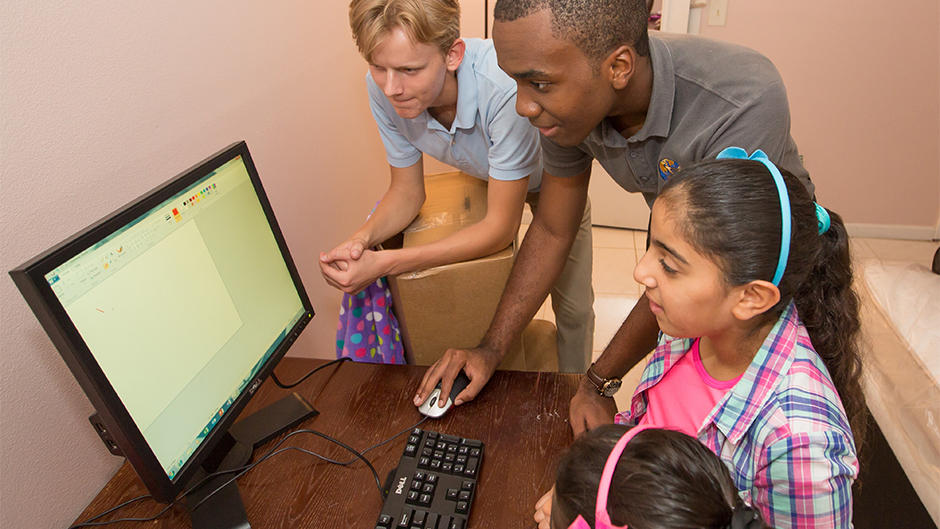Schools were among the first buildings destroyed when the bombs began falling on the Syrian city of Aleppo, robbing children of a precious commodity—an education.
Ten-year-old Satima and her sister Maryam, 8, found this out the hard way. After a projectile reduced their schoolhouse to rubble, they no longer had a place to learn math, history and other subjects.
Now, two and a half years after their family escaped war-torn Syria, fleeing first to Turkey until eventually resettling in the United States seven months ago, the sisters are learning once again, thanks to the efforts of a precocious University of Miami student.
Satima and Maryam now have a refurbished desktop computer, donated to them by Global Sigma, a UM student organization founded by Harold Tapamo, a 17-year-old senior majoring in biomedical engineering who believes in the power of technology.
 Tapamo and Jared Klutke, Global Sigma’s social chair, delivered the PC to the girls’ Homestead apartment on a recent Tuesday, hooking up the device and connecting it to the Internet as their mother, Batoul, looked on.
Tapamo and Jared Klutke, Global Sigma’s social chair, delivered the PC to the girls’ Homestead apartment on a recent Tuesday, hooking up the device and connecting it to the Internet as their mother, Batoul, looked on.
“It will help them learn English,” Batoul, who did not want to give her family’s last name, said through a translator. “And that’s one of my hopes for my children—that they learn the language of their new country, finish high school, go on to college and earn a degree, and be happy and safe.”
Batoul, her husband and their two daughters were one of five Syrian refugee families who recently received refurbished computers through Tapamo’s organization.
Seven-year-old Shams and 5-year-old Aisha received their computer on the same day, the two sisters sprinting up to their second-floor Homestead apartment after school to check out the device, which their mother, Mouna Aljabra said they will use to learn English and do homework.
“We don’t want to depend only on the schools,” said Aljabra. “My children are anxious to learn, and this computer will help.”
Tapamo, a graduate of Florida Virtual School who was admitted to UM at 13, said his organization is dedicated to helping Third World nations and believes technology is one way of empowering marginalized people like the Syrian refugee families displaced by the civil war in their country.
“I always like to use the example of the printing press,” said Tapamo. “When it was first introduced as new technology, it made reading available to the masses as opposed to just writings that were available to very high-ranking officials. It enabled people to learn about topics they’d never heard of. Today’s printing press is the computer, and providing people with computers and allowing them to have access to such a vast sea of knowledge has a similar effect.”
The University of Miami Surplus Property Department, collaborating with UM’s Office of Civic and Community Engagement, donated the computers to Global Sigma.
Tapamo said his organization, which has about 80 members, also is planning to donate PCs and laptops to communities in Bangladesh, Colombia, Haiti and the central African country of Cameroon, where his father worked as an engineer before coming to the United States.
But the group wanted to kick off their donation efforts locally with Syrian refugees, enlisting the help of the Florida Refugee Assistance Committee to connect with those families. “The harrowing stories of these families truly make what we do, as an organization, worthwhile,” said Tapamo, who thanked his vice president, John Solomon Graham IV, and faculty advisor Nelson Salas for their assistance.
Batoul said her family is forever grateful to Tapamo and his organization. Bombs destroyed their home and neighborhood in Aleppo, and Batoul considers herself lucky to be alive and make it to the U.S. through a resettlement agency.
While she said the newly donated computer will be an educational tool, daughter Satima has additional plans for it. “I want to download some of those exciting games I’ve seen,” she said. “That’s going to be really exciting.”

